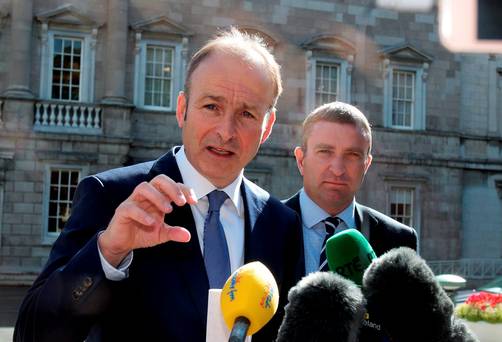Fianna Fáil has, over the last 12 months, revealed little about its preferred funding model for higher education. Today’s vote in the Seanad, however, gives the party an opportunity to solidify a stance that has moved little beyond a scepticism for loan schemes.
Their amendment to Labour’s motion calling for fully publicly funded education, which is due to be debated in the Seanad this evening, suggests the party’s position has only evolved slightly since the release of the Cassells report last July. The report, carried out by government’s higher education funding working group, set out three options for the future funding of the sector and brought no further consensus on the issue.
In their amendment, released last night, Fianna Fáil warn that the “public costs of income contingent student loan systems are extremely uncertain and can be very high”, adding that the experience of loan schemes, in countries like the UK, is “not positive”.
Today’s vote, the exact outcome of which will remain uncertain until later this evening, could offer the clearest indication yet of Irish parties’ attitudes to higher education funding. Fianna Fáil’s amendment, however, suggests that the party, while not fully committing to any position, is highly sceptical of the merits of an income-contingent loan scheme.
The debate on loan schemes has been revived in recent months, following the UK Labour Party’s proposal to end tuition fees at the last general election. Since then, numerous political figures have questioned the size the fee – one of the largest in the world – as well as the success of a system that triggered deep unease among students in the country when first introduced and has been widely criticised since.
But Fianna Fáil’s proposed amendment doesn’t make the the party’s stance on the issue much clearer – compared to parties like Labour and Sinn Féin who openly oppose loan schemes. Last year, speaking to The University Times, Fianna Fáil Education Spokesperson, Thomas Byrne, used similar language to describe loan schemes and the party have instead focused on calling for an expansion of postgraduate grants and increased state funding to the sector – two things long called for by the Union of Students in Ireland (USI).
The Labour motion, brought by the party’s senators, will be a rare opportunity to hear politicians debate an issue that has received little political attention in recent years. USI is set to bring numerous student union presidents and other activists from across the country to watch a vote that will give the union a useful barometer for the level of support for publicly funded education in the Oireachtas.
Michael Kerrigan, President of USI, admitted he was a little disappointed by the amendment from Fianna Fáil. “The door hasn’t been shut on loan schemes from a Fianna Fail point of view yet”, he said, adding it was also disappointing that the party hadn’t criticised the current level of the student contribution charge.
Instead, the party states that “the answer to solving funding and sustainability crisis in third-level institutions is not to raise student contribution fees”.
Lobbying has been one of the key strategies pursued by a union that has stepped up its efforts in recent years to engage with TDs and senators, especially those in senior party positions or on the Oireachtas Education and Skills Committee. The Fianna Fáil position, however, falls short of USI’s position, despite the party’s emphasis on postgraduate grants.
“I think if the lobbying we’ve done didn’t happen, we’d be in a position where loans would nearly be guaranteed. The argument that USI put forward is that they failed internationally and they’d be very expensive to set up and that’s what Fianna Fáil have come out and agreed with”, Kerrigan said.
Fine Gael’s amendment, put forward by Senator Jerry Buttimer, makes no reference to a preferred funding model, instead relying on the party’s watchword of “consensus” and the need to build agreement around the issue.







